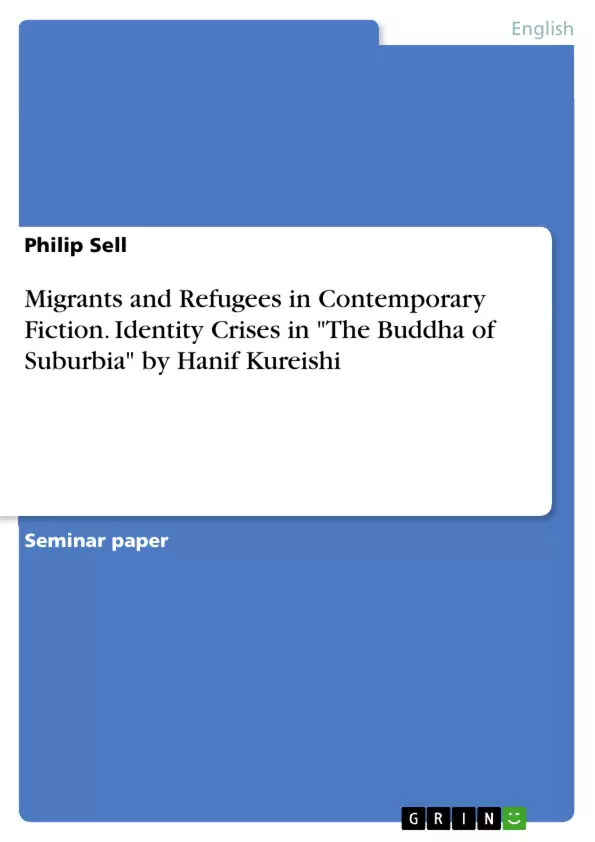The term paper consists of an introduction, three main chapters and a conclusion. The first part of the main chapter demonstrates the different forms of identity crises which are thematised in the novel “The Buddha of Suburbia” by Hanif Kureishi.
At this place some theoretical terms just like hybridity need to be mentioned and explained for a further understanding. Furthermore, the reader gets familiar with some other characters who play an important role in terms of identity. Part two and three of the main body specifically focus on the novel's main protagonist as well as on two major forms of identity crises. First of all Karim's Indian background is taken into account accompanied with the problems his cultural hybridity causes. Afterwards the many sexual experiences the narrator gains in the novel are investigated. Which events have an impact on his personality? Which kinds of inner conflicts does he have to face and does he manage to solve them or does he miserably fail? All these questions are answered in the main body. The conclusion contains a summary of all important aspects investigated in the paper. Moreover the thesis which was proposed in the introduction will either be confirmed or confounded.
Inhaltsverzeichnis (Table of Contents)
- Introduction
- 1 Identity - The Novel's dominating Theme
- 2 Karim's cultural Hybridity.
- 3 Sexual Identity – Process and Progress?
Zielsetzung und Themenschwerpunkte (Objectives and Key Themes)
The term paper aims to demonstrate that identity and identity crisis are the dominating themes of Hanif Kureishi's novel, "The Buddha of Suburbia". This paper will also explore the different forms of identity crises, such as cultural hybridity and sexual identity, and analyze the protagonist's development throughout the story.
- Identity Crisis in "The Buddha of Suburbia"
- Cultural Hybridity and its Impact
- Sexual Identity and its Role in the Narrative
- Protagonist's Development and Transformation
- Exploration of Race, Class, and Gender Dynamics
Zusammenfassung der Kapitel (Chapter Summaries)
The first chapter delves into the various forms of identity crises depicted in the novel, including cultural hybridity. It introduces key characters and provides theoretical frameworks for understanding the complex issues presented in the story.
The second chapter focuses on Karim's cultural hybridity, examining his struggle with his Indian heritage and his experiences as a second-generation immigrant in England. This section explores the impact of cultural hybridity on his sense of identity and belonging.
The third chapter explores the themes of sexuality and sexual identity through the protagonist's journey. It examines the impact of various sexual encounters and relationships on Karim's development and his internal struggles.
Schlüsselwörter (Keywords)
The key terms and concepts explored in this paper include: identity, identity crisis, cultural hybridity, sexual identity, race, ethnicity, class, gender, immigration, postcolonialism, British literature, Hanif Kureishi, "The Buddha of Suburbia," and multiculturalism.
Frequently Asked Questions
What is the central theme of the paper on "The Buddha of Suburbia"?
The paper demonstrates that identity and identity crises are the dominating themes in Hanif Kureishi's novel.
Which specific forms of identity crises are analyzed?
The analysis focuses on cultural hybridity and sexual identity as two major forms of identity crisis experienced by the protagonist.
How is the term "hybridity" used in this context?
Hybridity is used as a theoretical term to explain the problems caused by Karim's Indian background and his life as a second-generation immigrant in England.
Does the paper examine the protagonist's development?
Yes, it investigates the events that impact Karim's personality and whether he manages to solve his inner conflicts.
What are the key keywords of this study?
Keywords include identity crisis, cultural hybridity, sexual identity, Hanif Kureishi, postcolonialism, and multiculturalism.
- Quote paper
- Philip Sell (Author), 2017, Migrants and Refugees in Contemporary Fiction. Identity Crises in "The Buddha of Suburbia" by Hanif Kureishi, Munich, GRIN Verlag, https://www.grin.com/document/994829



